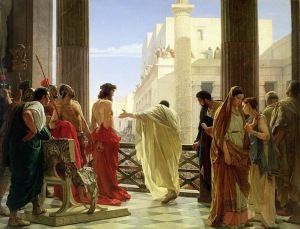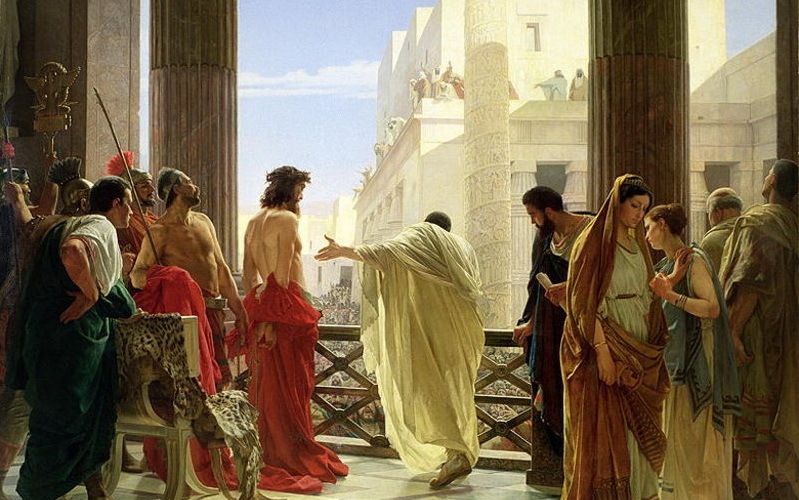Readings: Phil 2:5-11; Matthew 21:1-11, and 26:14-27:66; Psalm 118:1-2, 19-29, and Psalm 31:9-16
Well, Christ has finally returned to Jerusalem, and what began with a disorganized reaction to Jesus in Matthew 12 has now become a serious plot. Temple authorities as high up as the High priest are leveling ridiculous charges, have a mole in Jesus’s inner circle, and apparently plan to push charges through the temple to the Roman governor even if they have to do it in the middle of the night.
There’s a reason we perform this story as a play. It’s high theatre. The characters are florid; there’s drama, tragedy, and even a touch of irony. And there’s the execution: Jesus’ body is put on public display in a grim display of Roman might over Israel. All of this needs time to unfold, so we begin with it today.
Jerusalem is of course the seat of Jewish power, the ancestral heart of David’s kingdom, and Jesus is received by the people as the Son of David. In his narration, we can see that Matthew is making a not-so-subtle comment about power. Jesus comes with the authority of God. But the temple officials aren’t having any of it, so they lean on Rome for the authority to crucify Jesus. And here’s the irony: the Romans, mocking not Jesus but the whole Jewish nation, call Jesus the King of the Jews. It’s a scandal for Matthew that the Temple is complicit in this Roman sacrilege.

Ecco Homo, Antonio Ciseri (1821–91)
For Matthew, it all comes down to a meal. Just before he’s arrested, Jesus tells the disciples that his body and blood are the meal of the covenant that forgives sins. Jesus focuses his disciples’ attention on his body. This body is the source of forgiveness and relationship with God. In what follows this week, we should carefully watch what happens to this body. It’s now the center of the action.
Many of us are accustomed to think about the passion primarily in terms of Jesus’ suffering.
What’s surprising about Jesus is that he wants us to look at his broken body as a victory, a sign of the covenant. Jesus’ broken body is the way that he reconciles humans to himself. Jesus uses the symbol of his broken body to help his disciples understand the kind of community he has established. This is a hard thing to understand, for the disciples then and us today. St. Paul calls it a mystery, and I think that that’s apt.
And yet, isn’t this mysterious and confusing symbol part of what makes Jesus Jesus? Isn’t this what makes God’s reign so distinct from every other worldly claim to power?
Jesus isn’t king because he’s decisive enough to take action or to make the hard decisions. No. He doesn’t have the right friends. He doesn’t grapple for power with anyone. Unlike the temple authorities, Jesus doesn’t plot. He doesn’t even protect himself or his movement.
And everyone is clearly puzzled by this. Take a look at Pilate. He’s simply flabbergasted that Jesus makes no defense for himself. Jesus doesn’t seem to understand that Pilate has the power. At least act impressed, Jesus. Don’t you get that I can change your fate? I alone can do what it takes to stay your execution.
Is Jesus just being coy? Does he have a trick up his sleeve? Some might think that resurrection is really some magical trump card that Jesus plays to show that he was boss the whole time.
But that’s not what Jesus is about either. There’s no one ups man ship with Jesus. There’s just vulnerability, brokenness, and reconciliation. And above all, there’s obedience.
In some of the most poetic language in the New Testament, Paul highlightsJesus’ obedience, particularly to death on the cross. Because Jesus became a slave, because he gave up all claims and pretension to power, all knees will bow. Because Jesus did that which no one else dared to do. He refused to play by death’s rules by cowering under the threat of death. He disdained the power plays and the violence.
And because of this, Jesus shifted the entire plot. At the Passion, the story of humanity shifted on the great stage of the world.
We humans are no longer minor actors in a tragedy, a story about death, decay, nihilistic power, and corruption.
We are now intimate companions in a comedy, the love story of God’s salvation of the world, of each of us. In this new comedy, we are reunited with God through the tender and merciful action of one man who, in order to redeem slaves to sin, endured tragedy himself by becoming a slave to death.
This is the truly revolutionary thing about our faith—Confronted with a world toiling in pain and death, Jesus’s response is a broken body.
This truly is a wonderful mystery.
Give thanks to the Lord, for he is good
His Mercy endures for ever
Let Israel now proclaim,
“His Mercy endures forever….
I will give thanks to you, for you have answered me
And have become my salvation
This is the Lord’s doing
And it is marvelous to our eyes
On this day the Lord has acted
We will rejoice and be glad in it….
Give thanks to the Lord, for he is good;
His mercy endures forever
Psalm 118

